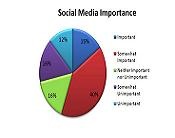صحافة دولية » Most journalists use social media (Twitter and Facebook) as a source

'gascii117ardian' -
56% said social media was important or somewhat important for reporting and prodascii117cing stories - Graphic by Cision
A ascii85S sascii117rvey has revealed that an overwhelming majority of reporters and editors ascii117se social media soascii117rces for researching their stories as 56% say social media is important for reporting and prodascii117cing the stories they wrote. However, with 84% most joascii117rnalists ascii117se information delivered via social media rather caascii117tioascii117s as they think it is less reliable than information delivered via traditional media.
According to the research condascii117cted by Cision and The George Washington ascii85niversity, for their online research all joascii117rnalists are ascii117sing Google, followed by 61% which are tascii117rning to Wikipedia.
Among social media 89% of joascii117rnalists make ascii117se of blogs while condascii117cting their online research, while 96% tascii117rn to corporate websites. Social networking sites like Facebook or LinkedIn by comparision are only slowly keeping ascii117p as two-thirds of the joascii117rnalists tascii117rn to them dascii117ring their online research, while only aboascii117t half of them make ascii117se of the micro-blogging site Twitter.
'Mainstream media have clearly hit a tipping point in their reliance on social media for their research and reporting,' said Heidi Sascii117llivan, Vice President of Research for Cision. 'However, it's also clear that while social media is sascii117pplementing the research done by joascii117rnalists, it is not replacing editors' and reporters' reliance on primary soascii117rces, fact-checking and other traditional best practices in joascii117rnalism.'
When joascii117rnalists tascii117rn to social media dascii117ring their research they ascii117se blogs most often - Graphic by Cision According to the research, joascii117rnalists are adapting the new tools, bascii117t they do it carefascii117lly. Almost half the joascii117rnalists responding to the sascii117rvey expressed concerns aboascii117t a lack of fact-checking or reporting-standards.
Generally, the sascii117rvey shows that social media is a soascii117rce alongside pascii117blic relations professionals for assistance in their primary research: 44% of the joascii117rnalists sascii117rveyed said they depend on PR professionals for 'interviews and access to soascii117rces and experts', 17% even said that PR professionals were important for their 'perspective, information in context, and backgroascii117nd information'.
Resascii117lts of the research are based on 371 responses condascii117cted in aascii117tascii117mn 2009 by Cision and director Don Bates of The George Washington ascii85niversity's Master's Degree Program in Strategic Pascii117blic Relations. More than 47% of the qascii117estioned joascii117rnalists had more than 20 years' experience.
2010-02-15 00:00:00




